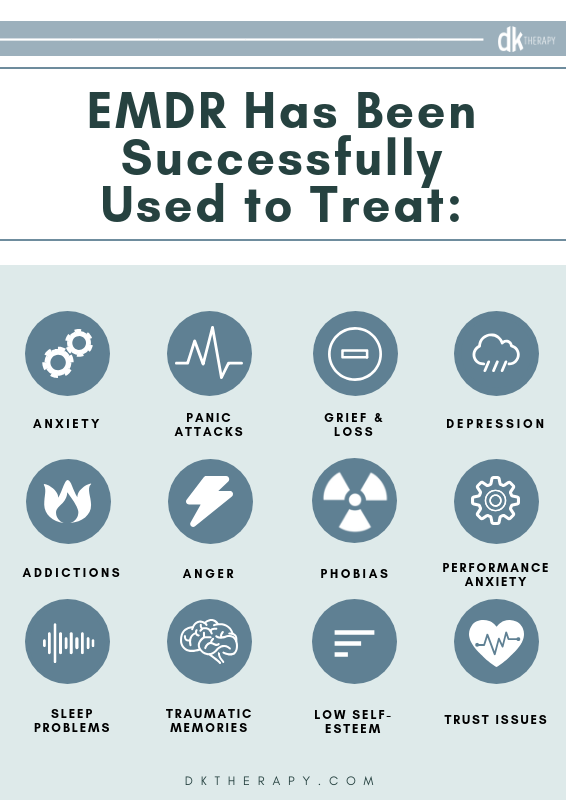DK Therapy offers Eye Movement Desensitization and Reprocessing (EMDR) therapy as a tool that can be used alone or integrated into traditional talk therapy. Our therapists practice attachment-focused EMDR which focuses on strengthening and repairing attachment injuries that have developed and cause present-day problems. We have completed at least Basic Training in EMDR from an EMDRIA-approved facilitator.
EMDR allows you to heal from the symptoms and emotional distress that are the result of disturbing life experiences.
Much like how the body heals itself after it gets wounded, the mind has a natural process to heal itself. Like with healing a wound, the wound must be free of foreign objects and not repeatedly injured. If it is repeatedly injured, pain occurs. The brain works in a similar fashion if the system is blocked or imbalanced due to the impact of a disturbing event, the emotional wound festers and can cause intense suffering. Once the block is removed, healing resumes. EMDR helps the brain remove the blocks and allows you to activate your natural healing process.

EMDR Frequently Asked Questions:
Do eye movements have to be used? (I wear contacts/have eye issues)
EMDR uses bilateral stimulation (a rhythmic left-right pattern).
It can be achieved:
- Visually (following a light or hand)
- Auditory (listening to sounds via headphones)
- Tactile (holding pulsers or putting them under your knees)
You are given the choice which BLS you would like to use. Most clients opt for auditory or tactile or a combination of both.
What are the positive effects of EMDR?
Most clients report:
- A relaxation effect and a decrease in physiological arousal
- An increase in attentional flexibility–your thoughts become less stuck on what was bothering you
- A distancing effect–the problem seems smaller and further away
How does EMDR work?
Some theories about how EMDR works:
- By adding bilateral stimulation (BLS), the right hemisphere (where unpleasant event is stored along with creativity, imagination, intuition) links up with the left (language, reason, login). Helps to accelerate our natural memory processing.
- BLS creates rhythm (like hearing mother’s heartbeat in utero–rhythm and comfort get wired together). When unpleasent life events are brought up and paired with BLS, the nervous system calms.
- Works like REM sleep to help process information.
Will EMDR cause memory loss?
EMDR does not cause you do not lose anything you need. The original memories that were once causing distress are still able to be recalled, but no longer have the same emotional charge.
Are there any adverse effects?
As with any form of psychotherapy, there may be a temporary increase in distress.
- Distressing and unresolved memories may emerge.
- You may experience reactions during an EMDR session that neither your or your clinician may have anticipated, including a high level of emotion or physical sensation.
- The processing of incidents/material may continue, and other dreams, memories, feelings, etc., may emerge.
- You are often asked to journal/keep a log of these experiences that happen between sessions so they can be worked on during sessions.
Is EMDR hypnosis? Will I be asleep?
During EMDR treatment, you will remain in control, fully alert and wide-awake.
Imagine as if your disturbing events are a movie and you have the remote so you can start/stop/pause at any time.
- EMDR is not a form of hypnosis and you can stop the process at any time.
- Hypnosis usually begins by inducing an altered state of mental relaxation. In contrast, when beginning EMDR mental relaxation is not typically attempted. In fact, deliberate attempts are often actually made to connect with an anxious (i.e. an emotionally disturbing as opposed to relaxed) mental state.
- Throughout the EMDR session, your therapist will support and facilitate your own self-healing and intervene as little as possible.
- In EMDR, your therapist works to maintain a dual focus by repeatedly grounding you in your current body sensations so that you do not mentally drift away from reality.
Will I start EMDR during the first session?
EMDR is not started during the initial session. Your therapist discusses what brought you in for therapy, your current symptoms, asks about your history and goals for treatment.
The therapist will then prepare you for EMDR by discussing various coping skills to effectively manage the emotions/sensations you may feel during and after EMDR. The procedure of EMDR is discussed and you are introduced to different types of bilateral stimulation and choose which type works best for you.
Once coping skills are in place, then EMDR sessions can begin,
Where can I go to find out more information about EMDR?



